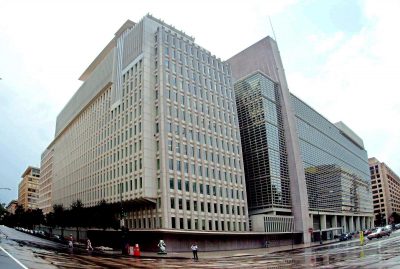Nigeria’s dysfunctional fiscal federalism is holding back the enactment of policies necessary to unlock growth, due to a lack of national consensus between the Federal Government and the 36 federating states.
This lack of co-ordination can be associated with multiple developmental challenges the country currently faces, the World Bank says in its maiden Nigeria Economic Report released in May.
“There is the difficulty of reaching a consensus for the effective conduct of countercyclical fiscal policy, which is essential for stability and a strong investment climate”, the World Bank says.
“Poor co-ordination between the Federal Government and states prevents the efficient concentration of government resources toward priority investments and interventions that could unlock the country’s economic potential.”
The lack of co-operation between the Federal Government and states, around priority infrastructure projects, such as the expansion of the Lagos Badagry Expressway and state governors’ opposition to the Sovereign Wealth Fund (SWF) is a symbol of how the fiscal federalism currently practised in the country is hindering development.
“It is not an overstatement to say that fiscal federalism remains a constraint on a more sustainable macroeconomic framework in Nigeria,” said Samir Gadio, an emerging markets strategist at Standard Bank, in London, in a response to questions.
“This is illustrated by the inability of the authorities to accumulate meaningful oil savings in the Excess Crude Account (ECA) which primarily reflects the continued pressure from the states to appropriate and distribute these proceeds.”
A majority of Nigerian states receive less than 10 percent of revenues from internal sources, making them solely dependent on oil revenues to run their respective states.
Worse still, negative growth in the oil sector has already caused government oil revenues to decline from 23.6 percent of Gross Domestic Product (GDP) in 2011 to 19.7 percent in 2012.
Oil revenues and production have been declining since the beginning of the year, leading to a drop in allocations to federal and state governments and a depletion in the ECA which has fallen in June to $5 billion from over $9 billion at the beginning of the year.
Most state governments are not ready for a worst case scenario, which portends a budget crisis for most of them, except perhaps Lagos, say analysts.
Common sense would then suggest that state governors would be in the forefront of efforts aimed at passing the Petroleum Industry Bill (PIB), curbing oil price volatility through the SWF or removing the fuel subsidy payments, whose inefficiency is a “major constraint on the country’s economic emergence,” according to Gadio.
This is often not the case, however, as the governors have filed a lawsuit currently before the Supreme Court, challenging the legality of the SWF, and often hedged their bets regarding support for the fuel subsidy removal.
The World Bank notes that reaching a consensus between the Federal Government and states should follow from “an increasing awareness that the countercyclical and co-ordinated fiscal policy have mutual benefits for all of Nigeria.”
In November 2012, the Lagos State government raised N80 billion in 7-year paper from the debt markets at a coupon rate of 14.5 percent.
However, if the current global sell off in emerging market debt and currency markets were to intensify, it could lead to a spike in Nigerian sovereign bond yields, especially if oil prices were to tumble without a cushion in the form of meaningful oil savings.
This would leave sub-national entities like Lagos which price off the sovereign, with higher borrowing costs in the event they want to refinance or issue new bonds.
Nigeria’s $1 billion sovereign wealth fund has “very little in it,” said Richard Fox, Fitch’s London-based head of Middle East and Africa sovereign ratings, on a conference call last week.
Fitch rates Nigeria at BB-, three levels below investment grade, while Moody’s Investors Service said last month that Nigeria’s slow implementation of structural economic reforms is limiting its chances of a credit-rating upgrade, along with corruption, weak institutions and vulnerability to oil-price drops.

